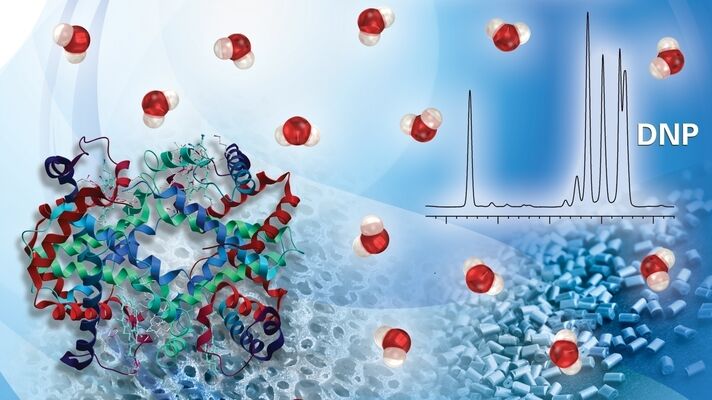

Dynamic Nuclear Polarization in the Study of Pharmaceuticals
In this webinar, DNP applications in the pharmaceutical industry and pharmaceutical science will be a particular focus, although any biologist, chemist, materials scientist or DNP NMR expert from other fields would also be interested in the discussion. In addition, a broad overview of DNP instrumentation will be given and various features of the NMR spectrometer will be described.
What You Will Discover
Talking at the seminar will be DNP expert Yongchao Su from Merck (Whitehouse Station, USA) and applications scientist Ivan Sergeyev from Bruker BioSpin (MA, USA).
DNP will be discussed as an enhancement technique in the study of natural abundance samples, which is particularly important in the pharmaceutical field. Ivan will discuss the great need to find techniques that will extend one-dimensional NMR to multi-dimensional NMR.
The use of DNP to study large proteins or complexes of proteins will also be touched on. The technique has boosted NMR signal to the point that it is possible to study anything from globular proteins to various membrane proteins so that specific structural questions can be quickly and easily answered. This is particularly the case in NMR crystallography, which is a hot topic. Yongchao is especially interested in conveying the benefits of DNP in terms of “really making something impossible, possible” and “changing the game board.”
A broad overview of Bruker’s solid-state dynamic nuclear polarization-enhanced NMR system will be given, including novel klystron-based DNP systems, utilizing a lower-power microwave source to generate electron polarization. All of this will tie in with a description of the various academic and industrial applications that users of DNP NMR could employ. The research that will be discussed is in the phase of cutting-edge techniques and applications and should be of interest to anyone wanting to hear how DNP could revolutionize their workflow in years to come.
Key Topics
- Pharmaceutical applications for the study of natural abundance samples in both industry and academia
- NMR crystallography in pharmaceutical science for rapid 3-D structure determination
- Advances in DNP NMR instrumentation
- DNP applications in structural biology and materials science
Who Should Attend?
- People in pharmaceutical sciences and pharmaceutical industry
- DNP and solid-state NMR biologists, chemists and materials scientists
- Anyone in the pharmaceutical field who is interested in rapid answers
- Anyone interested in studying natural abundance materials
- Anyone that uses solid-state NMR to answer any sort of structural or quality question in industry
- Anyone generally interested in DNP
Speakers
Yongchao Su, Ph.D
Principal Scientist and Head of Biopharmaceutical NMR Laboratory (BNL) in Pharmaceutical Sciences at Merck & Co, Inc.
Dr. Su is a Principal Scientist in the department of Analytical Research and Development at Merck & Co, Inc., United States, and an analytical lead of material and biophysical characterization. His solid-state NMR work focuses on investigating molecular basis of drug delivery and stability for drug product development. He teaches as an adjunct faculty member at the University of Texas at Austin and Purdue University. Yongchao has recieved postdoctoral training at Massachusetts Institute of Technology with Prof. Robert G. Griffin after his PhD at Iowa State University with Prof. Mei Hong. He is a member in Physical Analysis Expert Committee in United State Pharmacopeia, a Board Member of Eastern Analytical Symposium, a Co-vice Chair of Gordon Research Conference on molecular structure elucidation. He currently serves in the Editorial Advisory Board for Magnetic Resonance in Chemistry, Pharmaceutical Research, Molecular Pharmaceuticals, and Journal of Pharmaceutical Sciences, and as an Editor of the section of protein conformation forAmino Acids. He has contributed over 90 peer-reviewed journal articles and is a coinventor of patents on drug developments of therapeutic chemicals and proteins.
Ivan V. Sergeyev, Ph. D
Applications Scientist – DNP 15 Fortune Drive, Billerica, MA, 01821, USA
Ivan Sergeyev received his B.S. in biochemistry from the University of the Sciences in Philadelphia, with a research focus on ab initio chemical shift prediction for oligo- and polysaccharides. He subsequently completed his Ph.D. at Columbia University, where he studied the structure and function of viruses using a combination of conventional and DNP-enhanced solid-state NMR (SSNMR). His postdoctoral fellowship, also at Columbia University, focused on the development of new methodology for high-resolution structural elucidation by DNP-SSNMR. After a brief tenure as a staff scientist at the New York Structural Biology Center, he joined Bruker as a DNP Applications Scientist in July 2015. Ivan’s key research focus is the development of novel, high-impact applications for solid-state DNP spectroscopy, which includes efforts to expand the reach of DNP in biological systems as well as studies in the pharmaceutical and materials sciences.